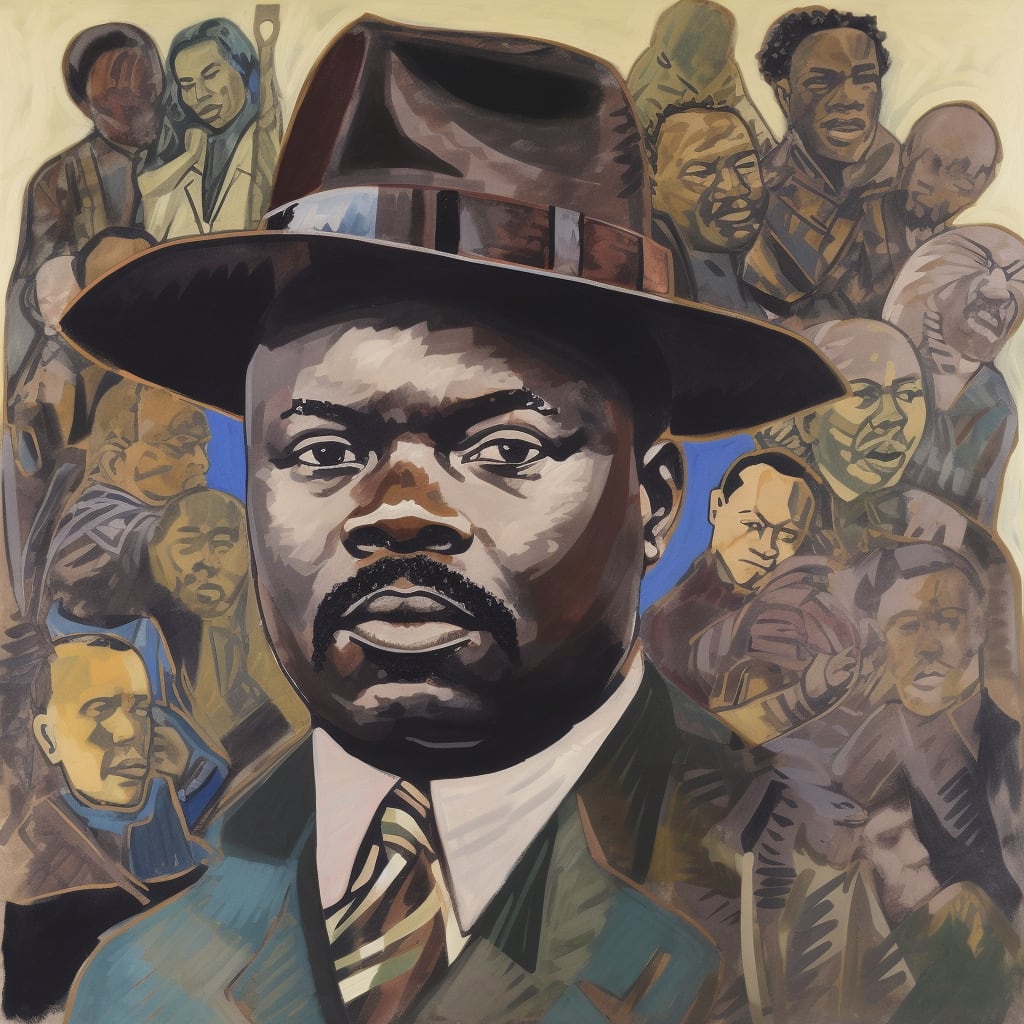Marcus Garvey & The Origins of Woke
Rise, ye Mighty People

Recently there has been a lot of controversy surrounding the word "woke." From Nike's 2018 Colin Kaepernick ad to P&G's My Black Is Beautiful campaign, companies have been criticized for being "too woke." Whatever that means. “Woke" has come to mean so many things to so many people that it is hard to understand what the word means. So let’s go back to the origins of the word “woke.”
According to John McWhorter, the term "woke" was first used in the 1930s in African-American Vernacular English (AAVE) to mean "aware" or "enlightened. “Woke” was also used in the African-American newspaper The Pittsburgh Courier in an article titled "The Negro Is 'Woke,” and in 1967, the Black Power activist Stokely Carmichael argued that African Americans needed to be "woke" to the reality of their oppression. Indeed, “woke” has had a long history of usage in the African-American community, especially during the early 20th century when it was used to denote an awareness of racial prejudice and discrimination . Human rights activists such as Ida B. Wells and James Weldon Johnson, creator of the Black National Anthem and even the staid and hardly revolutionary W.E.B. Du Bois, while not using the word "woke" wrote in The Souls of Black Folk , "The problem of the twentieth century is the problem of the color-line—the relation of the darker to the lighter races of men in Asia and Africa, in America and the islands of the sea.” If that ain't “woke,” then I don’t know what is.
And then, of course, there is Marcus Garvey, the most “woke” of these early human rights activists. Garvey didn’t mince words. He often used the words “wake” and “awake” in The Philosophy and Opinions of Marcus Garvey.
"Wake up, Ethiopia! Wake up, Africa! Let us work towards the one glorious end of a free, redeemed, and mighty nation. Let Africa be a bright star among the constellation of nations."
"It means that the Negro in the United States is today awake; he is aroused; he listens no longer to the flattery and the blandishments of the politician; he is beginning to look facts in the face.”
Garvey’s words were undoubtedly one of the inspirations behind Bob Marley's song, which appeared on the Survival LP (I’m giving away my age here), "Wake Up and Live!"
It’s also instructive that both Garvey and Marley use the words "wake" or "awaken" because the term has long-held religious, literary, and especially eschatological connotations. Again, in Philosophy and Opinions, Garvey wrote, "Awake! The day is upon you, go forth in the name of the race and build yourselves a nation, redeem your country Africa, the land from whence you came, and prove yourselves men worthy of the recognition of others." In other words, being "woke" for Black people is a matter of life or death. Or, to put it another way, in the words of the "Most Interesting Man in the World,": "Stay woke, my friends."
Notes
John McWhorter's book, "Woke Racism: How a New Religion Has Betrayed Black America," published in 2021, provides a critical analysis of the contemporary phenomenon of "wokeness," examining how it has transformed into a quasi-religious belief system that, according to the author, hinders genuine progress in addressing racial inequality and perpetuates a divisive and counterproductive approach to social justice (John McWhorter, Woke Racism: How a New Religion Has Betrayed Black America, New York: Penguin Press, 2021). The book offers a thought-provoking examination of the complexities surrounding race, identity, and activism in present-day America.
The Pittsburgh Courier published an article titled "The Negro Is 'Woke'" in 1930, highlighting the awakening of African Americans to the realities of racism and systemic oppression, serving as a testament to their growing awareness and determination to fight for equality (The Pittsburgh Courier, "The Negro Is 'Woke'" (1930)). The article sheds light on the evolving consciousness and resistance within the African American community during a time of deep-seated racial discrimination.
Stokely Carmichael, later known as Kwame Ture, delivered his influential speech "Black Power" in 1967, which became a rallying cry for the Civil Rights Movement, emphasizing self-determination, pride, and the importance of political and economic empowerment within the African American community (Stokely Carmichael, "Black Power," Speech delivered in 1967). The speech marked a pivotal moment in Carmichael's life and activism, inspiring a shift towards a more assertive approach to racial equality and justice.
" The Wikipedia article on "Woke" provides a comprehensive overview of the term's cultural significance and its evolution, tracing its roots in African American Vernacular English to its widespread adoption as a social justice concept, highlighting the ongoing debates and critiques surrounding its usage and implications (Wikipedia, "Woke," 2023).
In "The Souls of Black Folk," W. E. B. Du Bois delves into the complex realities of African American experience, addressing issues of racial identity, social inequality, and the duality of being black in America (W. E. B. Du Bois, The Souls of Black Folk, Chicago: A.C. McClurg & Co., 1903). This seminal work also reflects Du Bois' intellectual and ideological rivalry with Marcus Garvey, whose Pan-Africanist vision for black liberation posed a contrasting approach to Du Bois' emphasis on education, civil rights, and integration.
In "The Philosophy and Opinions of Marcus Garvey," Marcus Garvey passionately advocates for African self-determination, with the first volume edited by Amy Jacques-Garvey and published in New York by Atheneum in 1969. It is worth noting that the second volume was published while Garvey was in prison on trumped-up charges of mail fraud.
Released by Island Records in 1979, Bob Marley's album "Survival" stands as a powerful testament to his unwavering commitment to social justice and Pan-African unity, addressing pressing issues such as political oppression, racial inequality, and the emancipation of marginalized communities through his captivating reggae rhythms and thought-provoking lyrics (Bob Marley, Survival, Island Records, 1979). The album serves as a poignant call to action, urging listeners to confront and overcome the various challenges faced by individuals and societies striving for liberation and equality.
. In the novel "Ulysses," Stephen Daedalus, a character intricately connected to James Joyce and the theme of Irish identity, poignantly declares, "History is the nightmare from which I am trying to awaken" (James Joyce, Ulysses, Paris: Shakespeare and Company, 1922). This profound statement encapsulates Joyce's exploration of the impact of history on Irish identity and reflects the struggle to break free from the burdens of the past.
About the Creator
Geoffrey Philp
I am a Jamaican writer. I write poems (haiku & haibun), stories & essays about climate change, Marcus Garvey, music icons such as Bob Marley, and the craft of writing through personal reflection & societal engagement.
Reader insights
Outstanding
Excellent work. Looking forward to reading more!
Top insights
Expert insights and opinions
Arguments were carefully researched and presented
Compelling and original writing
Creative use of language & vocab
Easy to read and follow
Well-structured & engaging content
On-point and relevant
Writing reflected the title & theme






Comments (7)
That was a very enlightening article, thank you! The word "woke" has been so overused and abused that it has totally lost its meaning. I would venture to say that it's also an example of cultural appropriation for many.
Fantastic!!!💕❤️❤️
I have always disliked the way pop culture get hold of an idea and runs away with it, like 'unboxing', 'stay-cation', 'yolo', 'adorbs', 'vom'..... I could go on, but I won't. I always thought woke was on that list. Now it drives me crazy for a whole new reason! The casual use of a pretty profound term has very much taken it's significance away and I find that really sad. Thank you for sharing this, I found it very educational.
I was introduced to Garvey through the music of Burning Spear. This is a fantastic artocle
Marcus Garvey is considered a national hero in my country. He was certainly controversial and ambitious, but his heart was in the right place. Advocating for one's race, however the twists and turns is always admirable. This is an incredible insight into this topic. I now totally understand the concept of woke as it should be properly represented. Woke is actually the belief, pride and expectation in a thing as it should actually be. Thank you for such an eloquent presentation of facts as they should be understood. At least this is my understanding. The word may mean different things to different people.
Great article. Thx!
Thank you for sharing this.